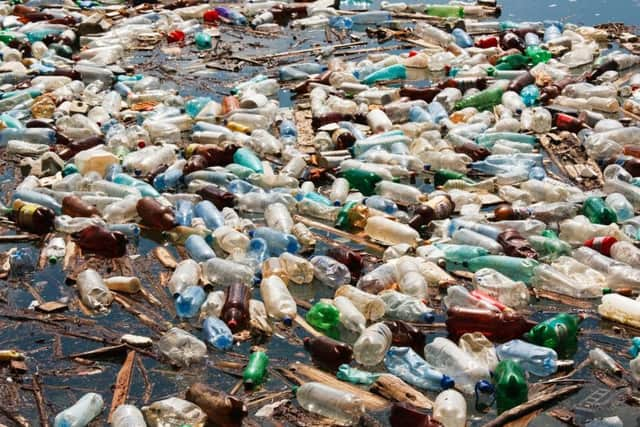Our discarded junk is the new peril of the sea


My new environment had me scuttling out into the garden this week during storm force winds to retrieve a plastic bag which had impaled itself on my hedge thick with thorn bushes.
Perhaps the offending bit of plastic had come from my own household. On the other hand I suspect it had blown in from elsewhere as I do try to make sure that my rubbish is binned correctly. It seems such a paltry thing to worry about and a decade ago I probably wouldn’t have given it a second thought leaving it there to shred itself and finally disappear. Except that plastic doesn’t disappear that easily, even if it’s a wafer thin bag. No. It careers around our landscape without a care in the world ending up in an ocean somewhere to be pounced upon by a hungry creature of the sea.
Advertisement
Hide AdAdvertisement
Hide AdThree days ago, after some stormy weather, I stood above a little beach looking down on a large black plastic bin, several soft drinks bottles with caps on, a wellington boot, a green plastic buoy, applicators for sanitary items, bits of synthetic rope, plastic bags and the inevitable coffee cups, all caught up in swathes of seaweed.


Sea birds were clambering over it no doubt hoping to find something to eat, just as fish do in the water. Some of this stuff will return to the sea again in the next tide as, in this fairly inaccessible beach, it won’t be easily retrieved before that happens. Some of this will have fallen off ships and smaller craft but most likely it will have originated on land with wind projecting it seaward. Some of it – sanitary items – will originate in our toilets ending up in the public sewage system. The sea eventually becomes the receptor of most of it.
We’ve never given this a moment’s thought in the past but Sir David Attenborough has been pricking the collective conscience recently. The latest Government report on the subject Foresight Future of the Sea Report is designed to prick the collective conscience about our environment. We’ve all seen the lay-bys filled with litter dumped out of cars the drivers of which have most likely stopped for lunch or maybe a picnic. It would be so easy to just take the litter home to be put in the relevant bin. But no, modern day drivers can’t be bothered with that. So much easier just to open the car window, dump it out and drive off. We’ve all witnessed these litter louts at times.
We recall too the hedgerows around major supermarkets looking like they’ve been wallpapered as the endless escapee plastic bags have taken flight. The 5p tax on bags may make a difference but we don’t know yet. Simply there is rubbish everywhere and our windy climate is no respecter of where it deposits it.
Advertisement
Hide AdAdvertisement
Hide AdThis new report suggests that we know more about the surface of Mars and the Moon than the deep sea bed and suggests that there are major opportunities for robotics, artificial intelligence and automated technology to fill gaps in understanding ocean science. But how long is all this going to take? Undoubtedly the oceans are ripe for commercial exploitation in the future – already they are produced wind power – but we don’t know enough yet about the effect of plastic pollution on those oceans. I would have thought we should tackle that issue first before turning the oceans into money making endeavours.


Professor Ian Boyd, chief scientific adviser for the Environment Department commenting in the Daily Telegraph this week states the obvious, that we need to minimise the amount of plastic, both macro and micro, going into the marine environment, in order to make sure that if there are toxic effects, they will be dealt with. He suggests this can be done by introducing new biodegradable plastics and more public awareness campaigns about marine protection. I suggest there is no time to waste if we are to prevent the ugly scenes I’m now witnessing on a daily basis by the sea.